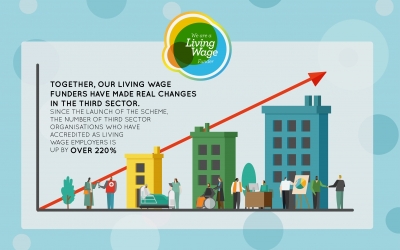Last week David Ainsworth from Charity Finance Group wrote an important article that reminded us about the challenges that many charities face in paying their staff a decent wage.
David was writing in response to the Government's announcement that the National Living Wage (the current legal minimum wage for over 25s) will increase from 60% to 66% of median earnings within five years, and will apply to over 21s. (See our response to that announcement here.) He welcomed the rise but raised the very valid concern that the "current funding of our sector comes with the minimum wage baked right into it."
Here at the Living Wage Foundation we promote the real Living Wage, an independently calculated, voluntary rate of pay that is based on the actual cost of living (currently £9 in the UK with a higher rate of £10.55 in London). There are already over 5,500 accredited Living Wage Employers who are choosing to pay the real Living Wage to all their staff, including over 1,500 charities.
Yet sadly, as David notes, a quarter of charity workers earn less than the real Living Wage, an incidence of low pay well above the UK average. This also disproportionately effects women and those from other disadvantaged groups. When we surveyed charities to understand why low pay is so prevalent in the sector, many charities described a tough and competitive funding environment in which they felt they were being asked to consistently deliver more for less. Wages have therefore suffered.
Our network of 48 Living Wage Funders are doing things differently. They are using their funding to support and enable their grantees to pay the real Living Wage, by encouraging grantees to cost up any applications to cover the Living Wage, express their support of grantees paying their staff fairly, and point them towards becoming a Living Wage Employer as best practice. However, it is important to note, this scheme is not about creating more hoops for charities to jump through; we don't ask funders to mandate the Living Wage for their grantees, but support and enable them to do so where possible.
We are proud to have The Lottery Community Fund, People's Health Trust, Youth Music, West Midlands Police & Crime Commissioner, Comic Relief and The Health Foundation as part of our movement, as well as many others including local authorities. Collectively they have over £1bn funding power and are making waves in the sector.
Last year we launched our Low Pay in the Charity Sector Action Plan which highlighted the need for more awareness about the real Living Wage in the sector, more support from funders, but crucially the need for government commissioners to be funding at the Living Wage. Therefore, we are calling on local authorities and government bodies to step up and become Living Wage Employers and join our collective movement to challenge low pay through commissioning.
We will be celebrating our surprise 49th & 50th Living Wage Funders and discussing what is next for tackling low pay in the charity sector at our Living Wage Week event from 5:30-7:30pm Thursday 14th November at Jerwood Space in London. If you are interested in attending, please contact lucy.bannister@livingwage.org.uk. Charity workers often look after the most vulnerable in society, we cannot and must not allow them to languish in financial hardship.

